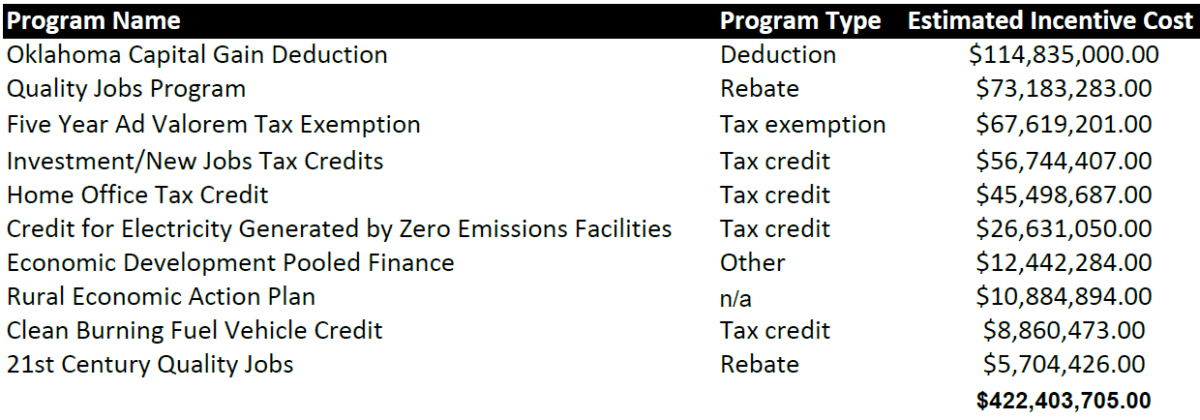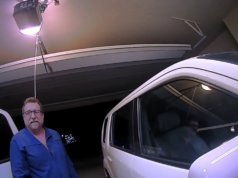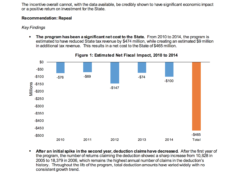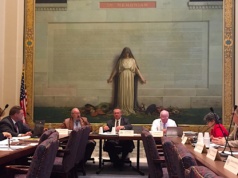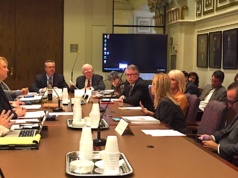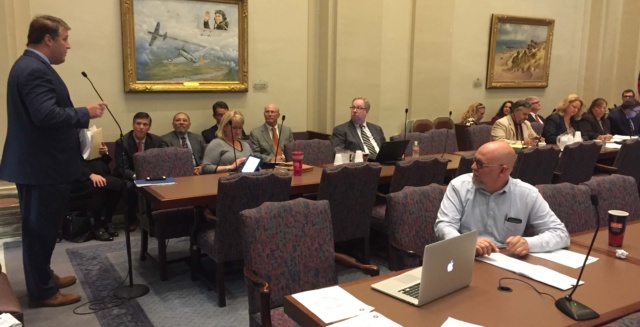

At an Incentive Evaluation Commission meeting today, the director of Oklahoma’s Film & Music Office struggled to hold back tears while she read a statement in defense of the state’s film enhancement rebate, which a contracted firm has recommended be repealed or allowed to expire.
“I got this,” Tava Maloy Sofsky said as she composed herself. She asked commissioners to consider “the passion” associated with the situation and that they “allow our program to continue.”
The Incentive Evaluation Commission hired a contractor, The PFM Group, to review and evaluate state tax credits and incentives. PFM Group returned the first of its evaluations Nov. 1, and among them are recommendations to repeal or reconfigure certain credits, which will likely be unpopular to the industries that benefit from them currently.
Chiefly, a recommendation to repeal the state’s film enhancement rebate — or let it sunset as scheduled in 2024 — could be controversial. The Oklahoma Film & Music Office has long boasted of bringing several film or TV productions to Oklahoma, and Sofsky said Thursday that more than 30 projects had been approved since 2014, when the Legislature renewed the rebate for 10 more years.
Still, the high rate of rebate (37 percent) and an ongoing need to increase that amount to keep pace with other states and even Canada has often left critics skeptical of a positive return on investment.
“There is no evidence that the Oklahoma film industry has strengthened during the time period when the rebate has been available,” the PFM Group’s draft evaluation states.
Arguing that the PFM report included inconsistencies, Sofsky emphasized the program as “a cash rebate” as opposed to a “tax incentive.”
Several people also spoke on the other incentives being considered by the IEC, which must hold a vote by Dec. 1 to either approve or disapprove of the recommendations.
The next IEC meeting will be at 1 p.m. Nov. 22, but, if there are unresolved disagreements during that meeting, voting on the recommendations may be delayed until Nov. 29 or 30. A final report must be submitted to Gov. Mary Fallin and legislative leaders by Dec. 15. Any changes to the incentives would require legislative action.
The following quotes about incentives were taken from the PFM Group’s reports, originally released Nov. 1, and comments from Thursday speakers are included where available.
Zero emission incentive
“Reconfigure the program to cap program credits or accelerate the closing of the program window (currently January 1, 2021) to January 1, 2018. Allow non-wind generating zero emission facilities to continue to claim the credit until January 1, 2021.” — PFM Group
Jeff Clark with the Wind Coalition said he was disappointed in the draft report provided to the commission. He said he felt the commission got “only about one-third” of the story.
“Specifically, it overlooked the local economic impact,” Clark said. “It does not talk about the companies that are moving to Oklahoma to take advantage of wind power. (…) It does not talk about the interchange between natural gas and wind. Oklahoma is sitting on a gold mine.”
But Jonathan Small, director of the Oklahoma Council on Public Affairs, argued the exact opposite.
“We’re actually somewhat disappointed in the report because we think it didn’t go far enough,” Small said. “All you need to do is look at the report to tell that the benefit is not exceeding the cost.”
He pointed to Tuesday’s election results before saying, “Voters are tired of crony capitalism.”
Still, Clark said any attempt to move forward the sunsetting of the zero emission incentive was short sighted.
“We think this report is not a healthy start to a constructive dialogue,” Clark said. “We are in a process of phasing out all the wind incentives in Oklahoma, and we think that’s a healthy thing to do.”
The current program window would close Jan. 1, 2021, although the PFM Group’s draft recommendation called for it to be pushed forward to Jan. 1, 2018. It also recommended allowing non-wind facilities to continue through the 2021 date.
Industrial road incentive
The group recommends repealing the industrial access road program. “Without more robust data, it is not possible to articulate the economic benefits of this program with any certainty. The data that is available indicated that it is unlikely the Industrial Access Road Program has a meaningful impact on the location decisions of the majority of projects funded.” — PFM Group
Two people spoke Thursday on this topic. Commission member Deby Snodgrass asked Oklahoma Department of Transportation executive director Mike Patterson how money expended under this program differed from normal ODOT funding. Patterson said it came from the same appropriations and the roads must be public.
“So it’s not an incentive?” Snodgrass asked.
“That’s correct,” Patterson said. “This is $2.5 million we can’t stick into an eight-year plan. We have to have it sitting there ready to use often within months’ notice.”
Brien Thorstenberg from the Tulsa Regional Chamber of Commerce told the commission that the Macy’s order fulfillment center, built in 2013, benefited greatly from $500,000 under the road program. He called it the “key state incentive” to help land that facility in Tulsa.
RELATED
Top-10 tax incentives revealed, commissioner criticized by Josh McBee
Oklahoma aircraft excise tax incentive
“Goals are not identified and data does not provide a ready method of determining overall impact on the industry in the State. Reconfigure by focusing the exemptions around a policy goal.” — PFM Group
Sandra Shelton of the Oklahoma Aeronautics Commission told the IEC Thursday that the OAC has been dealing with “charter abuse” relating to the excise tax incentive.
“If I was a wealthy business owner, and I bought a $10 million aircraft, I could avoid $600,000 in taxes by listing it as a charter,” Shelton said. “However, when someone went to a company to charter my aircraft, I could say it was booked.”
She said the OAC wants to set a requirement that any plane listed as a charter must be used in that regard 50 percent of the time.
Oklahoma Capital Investment Board incentive
“Retain within its current parameters to allow OCIB to complete its scheduled activities prior to its legislated sunset. There is no compelling conclusion related to reversing the sunset imposed by the Legislature, particularly given short-term budget issues facing the State.” — PFM Group
Speakers noted the importance of the OCIB regarding the temporary relocation of the New Orleans Hornets to Oklahoma City more than 10 years ago.
Ad valorem exemption for manufacturing
“Retain but consider revising program eligibility requirements that have been the same in some cases since program inception.” — PFM Group
No one spoke Thursday on this incentive.
Historic rehabilitation incentive
“The project team recommends that Oklahoma retain the program and adopt an annual cap to ensure some measure of future budget predictability.” — PFM Group
No one spoke Thursday on this incentive.
Quality events incentive
“Reconfigure. The State should (1) eliminate the process of estimating the projected economic impact prior to the completion of the qualifying event; (2) create a standardized application template with clear guidelines; (3) designate a single point person or office to respond to applicant questions.” — PFM Group
No one spoke Thursday on this incentive.









